四年级英语下册 Module 7 Unit 1 I helped Mum一课一练(含解析) 外研版(
四年级英语下册教案-Module 7 Unit 1 I helped Mum.(1)-外研版(三起)

四年级英语下册教案-Module 7 Unit 1 I helped Mum(1)-外研版(三起)教学目标1.能够听懂、会说、会读、会写单词help, mum, dinner, cook。
2.能够听懂、会说、会读、会写以下句型:•What did you do yesterday?•I helped Mum.•What did you help your mum do?•I helped her cook dinner.3.学会用英语描述自己和家人的日常活动。
教学重难点•如何正确使用句型What did you do yesterday?和I helped Mum.。
•辨认并正确书写单词help, mum, dinner, cook。
教学准备教学卡片,图片,教学实物,PPT讲义,课堂格言。
教学过程1. Warm-up•T: Good morning, boys and girls. Today, let’s talk about what we did yesterday. What did you do yesterday?•Ss: (Raise their hands and answer)•T: Great job. Let’s listen to some students’ answers.•(Teacher listens to a few student responses and writes some key words on the board. Key words include: ride a bike, swim, play games, watch TV, help mum, etc.)2. Presentation•T: Today, we’re going to l earn some new words and sentences. Please look at the screen. (Teacher shows the PPT slide with new words –help, mum, dinner, and cook).•T: Can you read these words with me? (Teacher reads the words and students repeat after her.)•T: Now, let’s learn some sentences. (Teacher shows the PPT slide with new sentences.)•T: Can you repeat after me? (Teacher models the correct pronunciation and intonation of each sentence, and students repeat after her.)3. Practice•T: Let’s practice the new sentences together. (T eacher randomly calls on students to answer the questions.) What did you do yesterday?•Ss: (raise their hands and answer)•T: Great! Now, please use the sentence I helped Mum to answer the next question. What did you help your mum do?•Ss: (raise their hands and answer)•T: Wonderful job, everyone!4. Production•T: Now, let’s practice describing our daily activities. Please stand up and find a partner. One of you will ask the question What did you do yesterday? And the other will answer using one or more of the new sentences we learned today.•(Students practice asking and answering the questions, and teacher walks around the classroom to monitor and assist.)•T: (After a few minutes) Time’s up. Please sit down.5. Summary and reflection•T: Before we finish today’s class, let’s summarize what we learned today. Can someone tell me a new word we learned today?•Ss: (raise their hands and answer)•T: Great job! Can someone tell me a sentence we learned today?•Ss: (raise their hands and answer)•T: Excellent! Remember to review what we learned today so you can get better and better at it.•T: And finally, let’s reflect on today’s lesson. What did you learn today?•(Teacher listens to a few student responses and provides positive feedback.)课堂格言。
外研版四年级下册Module7--Unit1-I-helped-Mum

写出下列单词的过去式。
help ( helped ) phone ( phoned ) cook ( cooked ) wash ( washed ) do ( did ) watch ( watched ) have ( had ) row ( rowed ) am ( was ) are ( were )
What about…?
…怎么样?
What about Sam?
He didn’t help Mum.
He played on the computer and
he watched TV.
didn’t = did not
没有;其中did是助动词do的 过去式,
What about Tom?
Tom helped Mum too.
1.I cooked nooldes yesterday. 2.I helped Mum 3.I washed clothes. 4.He didn't help Mum. 5.He played on the computer and he watch TV 6.Tom helped Mum too 7.I love him.
had phone cook did really wash didn’t=did not What about…? computer love
Read
I cooked noodles yesterday . He didn’t help Mum. He played on the computer.
(had/haved) a happy day
yesterday. They are (having/ had) a
happy day now.
外研版四下Module7Unit1IhelpedMum单元教学设计
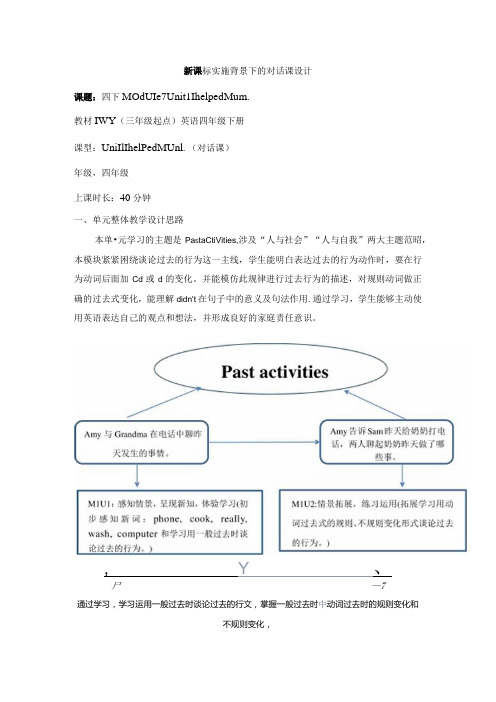
新课标实施背景下的对话课设计课题:四下MOdUIe7Unit1IhelpedMum.教材IWY(三年级起点)英语四年级下册课型:UniIlIhelPedMUnl.(对话课)年级,四年级上课时长:40分钟一、单元整体教学设计思路本单•元学习的主题是Pa S taCtiVities,涉及“人与社会”“人与自我”两大主题范昭,本模块紧紧困绕谈论过去的行为这一主线,学生能明白表达过去的行为动作时,要在行为动词后面加Cd或d的变化。
并能模仿此规律进行过去行为的描述,对规则动词做正确的过去式变化,能理解didn't在句子中的意义及句法作用.通过学习,学生能够主动使用英语表达自己的观点和想法,并形成良好的家庭责任意识。
, Y 、尸—7通过学习,学习运用一般过去时谈论过去的行文,掌握一般过去时中动词过去时的规则变化和不规则变化,二、语篇研读(附图)What l本出课选自外语教学与研究出版社的英语(三年级起点)四年级下册Module7UnilIIhelpedMum.本部分学习的核心语言是运用一般过去时谈论过去的行为。
课文情景是Amy与Grandma在电话中交流了昨天Sam在家玩电脑、看电视,没有帮妈妈:Tbm帮妈妈洗碗,自己帮忙做饭、洗衣的行为,通过对话呈现了过去行为的基本表达方式和动词变化规律。
同时教育孩子们要多参加家务劳动,为家人做力所能及的贡献。
核心语言使用场景为日常生活常见,易于理解且学生感兴趣,对学生的个人生活态度的养成有积极的作用。
Why:本课时通过Amy与Gmndma在电话中交流了昨天发生的事情,学习用一般过去时谈论过去发生的事情“通过创设情景,激发学生的学习兴趣,鼓励学生把所学内容运用到生活实际中。
How:本课时是对话课教学模式,用一般过去时谈论过去发生的事情,同伴之间互动问答,谈论过去发生的事情,强调学生在自主探究、小组合作和多元评价的过程中提高沟通能力和解决问题的能力。
三、教学对黛分析在ModUle5、6中,学生己接到描述过去状态的WasAVCrC陈述、否定、一殷疑间表达形式。
英语外研新标准(三起)四年级下册-Module 7 Unit 1 I helped Mum教案 (1
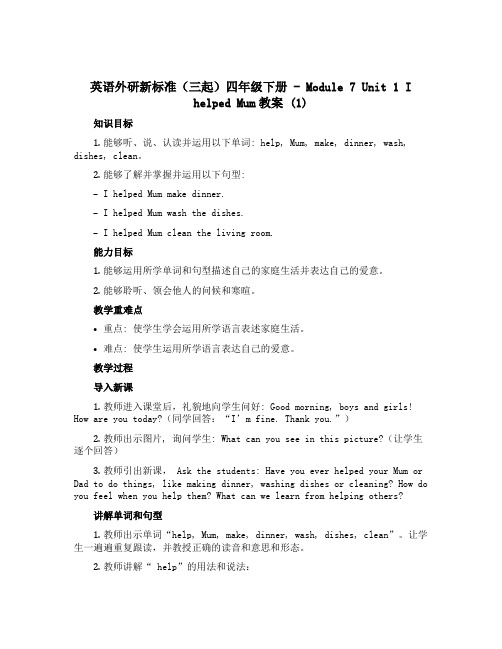
英语外研新标准(三起)四年级下册 - Module 7 Unit 1 Ihelped Mum教案 (1)知识目标1.能够听、说、认读并运用以下单词: help, Mum, make, dinner, wash, dishes, clean。
2.能够了解并掌握并运用以下句型:–I helped Mum make dinner.–I helped Mum wash the dishes.–I helped Mum clean the living room.能力目标1.能够运用所学单词和句型描述自己的家庭生活并表达自己的爱意。
2.能够聆听、领会他人的问候和寒暄。
教学重难点•重点: 使学生学会运用所学语言表述家庭生活。
•难点: 使学生运用所学语言表达自己的爱意。
教学过程导入新课1.教师进入课堂后,礼貌地向学生问好: Good morning, boys and girls! How are you today?(同学回答:“I’m fine. Thank you.”)2.教师出示图片, 询问学生: What can you see in this picture?(让学生逐个回答)3.教师引出新课, Ask the students: Have you ever helped your Mum or Dad to do things, like making dinner, washing dishes or cleaning? How do you feel when you help them? What can we learn from helping others?讲解单词和句型1.教师出示单词“help, Mum, make, dinner, wash, dishes, clean”。
让学生一遍遍重复跟读,并教授正确的读音和意思和形态。
2.教师讲解“ help”的用法和说法:–help sb. to do sth. 代表“帮助某人做某事”。
Module 7 Unit 1 I helped Mum (教案)外研版(三起)英语四年级下册

外研版新标准英语三年级起点四年级下册《Module7 Unit 1 I helped Mum》教学设计一、教学目标一、知识目标(1)学生能正确认读理解词能正确汇:had, cook, wash, did, didn’t=didnot,computer ,love ,him以及What about..?(2)学生能运用I +Ved谈论过去的做过的事情。
(3)能够听懂、会读本课对话。
二、能力目标学生能运用一般过去时I +Ved谈论过去做过的事情。
三、情感目标1、进一步了解英语国家人们的日常活动。
通过活动、游戏使学生产生学习英语的兴趣,培养学生敢于开口,乐于开口,积极参与交流的意识。
2、体验礼貌用语,并让学生在学习的过程中,培养他们的合作意识和竞争意识提高孩子在家主动分担家务劳动的意识和美德。
四、教学重点与难点:1、教学重点:行为动词的过去式V+ed及其发音。
2、教学难点:动词过去式的正确使用。
五、教学准备:单词卡、点读笔、课件、小磁铁。
六、教学过程:Step 1 warming up(热身环节)1、Greetings (师生问好good morning! How are you?)2、Sing a song(师生做动作齐唱)Hello,hello,hello,hello.(同桌相互挥手问候)Nice to meet you Nice to meet you.(同桌作揖)Hello,hello,hello,hello. (同桌相互挥手)[设计意图]课前师生问候简单的语言交流,增进师生感情,拉近师生距离,营造和谐师生关系。
师生共齐唱,活跃课堂气氛,营造英语学习氛围,为导入新课做好铺垫。
Step2.Lead in1、T:You sang very well. Here is a chant for you. Let’s chant.(打节拍说唱)I talked talked talked I walked walked walkedI cooked cooked cooked I washed washed washedI watched watched watched I played played played2、T:What did you find from this chant?Ss:动词后都加了ed, 以e结尾的动词后加了dT:You are so clever.今天我们来学习规则动词过去式的两种形式:动词后加ed和以e结尾的动词后直接加d来表示我们做过的事情。
Module7Unit1IhelpedMum单元整体教学设计

《Module 7 Unit 1 I helped Mum》课程以培养学生的英语学科核心素养为目标。通过本单元的学习,旨在提升学生的语言能力,使其能够熟练运用动词过去式描述过去发生的动作,增强时态意识;培养思维品质,让学生在学习过程中形成批判性思维,能够对不同家务情境进行合理推测和有效表达;提高文化意识,让学生了解并尊重中外家庭文化差异,树立正确的劳动观念;加强学习能力,激发学生的学习兴趣,使其在学习过程中主动参与、积极探索,形成有效的学习策略。这些核心素养目标的培养,将有助于学生全面发展,为今后的学习和生活打下坚实基础。
(三)新课呈现(预计用时:25分钟)
知识讲解:
清晰、准确地讲解动词过去式的知识点,结合实例帮助学生理解。突出动词过去式的构成和用法重点,强调易错点,通过对比、归纳等方法帮助学生加深记忆。
互动探究:
设计小组讨论环节,让学生围绕“昨天我做了什么”展开讨论,培养学生的合作精神和沟通能力。鼓励学生提出自己的观点和疑问,引导学生深入思考,拓展思维。
七、课后拓展
1. 拓展内容:
(1)阅读材料:提供与本节课内容相关的阅读材料,如英语绘本《David Helps His Mum》等,让学生在阅读中进一步巩固动词过去式的用法。
(2)视频资源:推荐与家务劳动相关的英语动画或教育节目,如《Peppa Pig》中有关家务劳动的片段,让学生在观看视频的同时,学习并模仿动词过去式的表达。
教学总结方面,本节课学生在知识、技能和情感态度方面取得了以下收获和进步:
1. 知识方面:学生掌握了动词过去式的构成和用法,能够运用所学描述过去发生的动作。
2. 技能方面:学生的听说读写能力得到了锻炼,尤其是在口语表达和听力理解方面有明显的进步。
小学英语《Module7 Unit1 I helped Mum.》优质课教学设计、教案
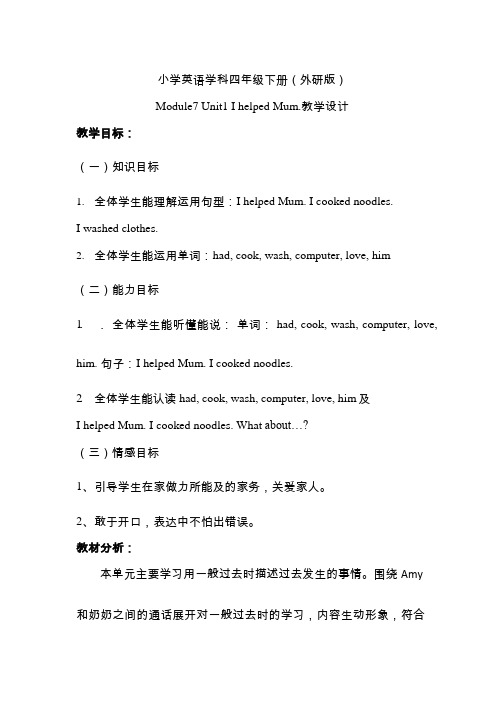
教学目标:小学英语学科四年级下册(外研版)Module7 Unit1 I helped Mum.教学设计(一)知识目标1.全体学生能理解运用句型:I helped Mum. I cooked noodles.I washed clothes.2.全体学生能运用单词:had, cook, wash, computer, love, him(二)能力目标1..全体学生能听懂能说:单词:had, cook, wash, computer, love, him. 句子:I helped Mum. I cooked noodles.2.全体学生能认读had, cook, wash, computer, love, him 及I helped Mum. I cooked noodles. What about…?(三)情感目标1、引导学生在家做力所能及的家务,关爱家人。
2、敢于开口,表达中不怕出错误。
教材分析:本单元主要学习用一般过去时描述过去发生的事情。
围绕Amy和奶奶之间的通话展开对一般过去时的学习,内容生动形象,符合本阶段学生的特点,容易与现实生活结合进行教学。
课文的情境是星期一Amy 和远在英国的奶奶通了一个电话。
Amy 告诉奶奶,自己昨天煮了面条、帮妈妈做了家务、还洗了衣服,奶奶高兴地夸奖了Amy。
随后,奶奶询问Sam 做了些什么,Amy 告诉奶奶,Sam 没帮妈妈干活,他只是在玩电脑游戏和看电视。
奶奶又询问,Tom 做了些什么,Amy 告诉奶奶,Tom 也帮忙了,于是奶奶也夸奖了Tom 。
重点难点1、重点:能理解:I helped Mum. I cooked noodles.和cooked ,washed 。
2、难点:能运用I helped Mum. I cooked noodles. 和cooked ,washed 来表达过去的做过的事教学方法:情景教学法、任务教学法教学过程:Step1: Warming up1.Greeting.2.Chant<Yesterday was a holiday.>T: (活动一的视频)Look at the picture.Yesterday was aholiday.What did they do? ?(初次感知过去式rowed )T: Now, let’s say the chant.(Clap. )【设计意图:TPR 复习学过的知识,为后面的学习做铺垫,激发学生的学习热情。
四年级下册英语教案-Module7Unit1IhelpedMum∣外研版(三起)
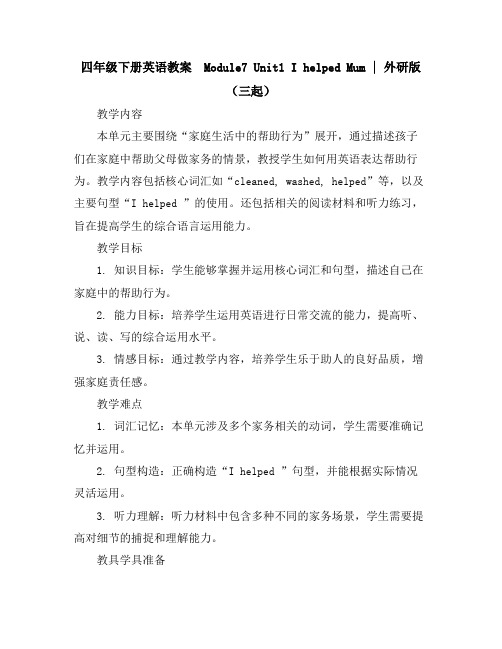
四年级下册英语教案 Module7 Unit1 I helped Mum | 外研版(三起)教学内容本单元主要围绕“家庭生活中的帮助行为”展开,通过描述孩子们在家庭中帮助父母做家务的情景,教授学生如何用英语表达帮助行为。
教学内容包括核心词汇如“cleaned, washed, helped”等,以及主要句型“I helped ”的使用。
还包括相关的阅读材料和听力练习,旨在提高学生的综合语言运用能力。
教学目标1. 知识目标:学生能够掌握并运用核心词汇和句型,描述自己在家庭中的帮助行为。
2. 能力目标:培养学生运用英语进行日常交流的能力,提高听、说、读、写的综合运用水平。
3. 情感目标:通过教学内容,培养学生乐于助人的良好品质,增强家庭责任感。
教学难点1. 词汇记忆:本单元涉及多个家务相关的动词,学生需要准确记忆并运用。
2. 句型构造:正确构造“I helped ”句型,并能根据实际情况灵活运用。
3. 听力理解:听力材料中包含多种不同的家务场景,学生需要提高对细节的捕捉和理解能力。
教具学具准备1. 多媒体设备:用于播放教学视频和音频材料。
2. 图片卡片:展示各种家务活动的图片,辅助词汇教学。
3. 角色扮演道具:模拟家庭场景,进行角色扮演练习。
教学过程1. 课堂导入:通过播放相关视频或图片,引起学生对家庭帮助行为的兴趣。
2. 词汇教学:利用图片卡片,教授新词汇,并进行朗读和拼写练习。
3. 句型练习:通过师生互动、小组合作等形式,练习构造和使用“I helped ”句型。
4. 听力训练:播放听力材料,让学生听并回答相关问题,提高听力理解能力。
5. 角色扮演:学生分组进行角色扮演,模拟家庭中的帮助场景,运用所学语言进行交流。
板书设计1. 核心词汇:列出本单元的重点词汇,并附上中文翻译。
2. 句型结构:“I helped ”句型的基本构造。
3. 听力材料摘要:简要记录听力材料的主要内容,便于学生回顾。
4. 课堂活动安排:列出本节课的主要活动流程,帮助学生跟上教学进度。
四年级下册英语教案-Module7Unit1IhelpedMum

四年级下册英语教案Module7 Unit1 I helped Mum.|外研社(三起)教学内容本课为外研社《新标准英语》四年级下册第七模块第一单元,主题为“我帮助了妈妈”。
教学内容围绕日常家庭生活中的帮助行为展开,通过学习本课,学生能够理解和运用过去时态描述过去发生的事情,同时学习一些常用的动词短语,如“cleaned the desk”,“washed the clothes”等,以及询问和回答帮助行为的句型。
教学目标1. 知识与技能:学生能够听懂、会说、会读本课的单词和短语,能够运用过去时态描述自己过去帮助他人的经历。
2. 过程与方法:通过角色扮演、小组讨论等活动,提高学生的英语听说能力和合作能力。
3. 情感态度价值观:培养学生乐于助人的良好品质,增强家庭责任感。
教学难点1. 正确运用过去时态描述过去的帮助行为。
2. 单词和短语的理解和记忆。
教具学具准备1. 多媒体课件2. 教学卡片3. 角色扮演道具教学过程第一环节:热身与导入通过日常对话,询问学生昨天做了什么,引导学生用过去时态回答。
展示与本课内容相关的图片,让学生预测本节课的主题。
第二环节:新知呈现利用多媒体课件展示课文内容,教授新单词和短语。
通过师生互动、生生互动,练习新句型。
第三环节:实践与练习分组进行角色扮演,模拟家庭帮助场景,运用本课所学语言。
小组讨论,分享自己在家中帮助父母的事情。
第四环节:巩固与拓展完成课本练习,巩固所学知识。
设计“我是家务小能手”活动,让学生在家中实践所学,并记录下来。
板书设计1. Module7 Unit1 I helped Mum.2. 画出思维导图,突出重点单词和句型。
3. 以图表形式展示动词短语的构成。
作业设计1. 完成课本练习题。
2. 写一篇小作文,描述自己昨天帮助家人的经历。
3. 家长签字确认学生在家的帮助行为。
课后反思本节课结束后,教师应反思教学效果,包括学生的参与度、语言运用能力以及情感态度价值观的达成情况。
Module7Unit1IhelpedMum(教学设计)外研版(三起)英语四年级下册
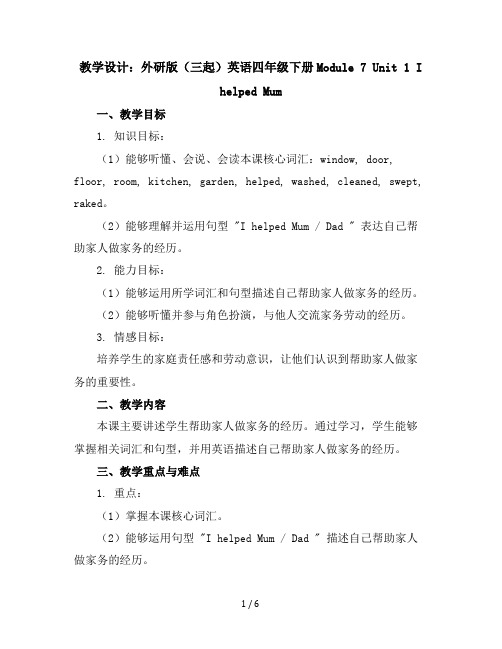
教学设计:外研版(三起)英语四年级下册Module 7 Unit 1 Ihelped Mum一、教学目标1. 知识目标:(1)能够听懂、会说、会读本课核心词汇:window, door, floor, room, kitchen, garden, helped, washed, cleaned, swept, raked。
(2)能够理解并运用句型 "I helped Mum / Dad " 表达自己帮助家人做家务的经历。
2. 能力目标:(1)能够运用所学词汇和句型描述自己帮助家人做家务的经历。
(2)能够听懂并参与角色扮演,与他人交流家务劳动的经历。
3. 情感目标:培养学生的家庭责任感和劳动意识,让他们认识到帮助家人做家务的重要性。
二、教学内容本课主要讲述学生帮助家人做家务的经历。
通过学习,学生能够掌握相关词汇和句型,并用英语描述自己帮助家人做家务的经历。
三、教学重点与难点1. 重点:(1)掌握本课核心词汇。
(2)能够运用句型 "I helped Mum / Dad " 描述自己帮助家人做家务的经历。
2. 难点:(1)正确运用动词过去式。
(2)在实际情景中灵活运用所学词汇和句型。
四、教具与学具准备1. 教具:PPT、黑板、粉笔。
2. 学具:课本、练习册、文具。
五、教学过程1. 导入:通过歌曲 "I'm a little teapot" 引导学生进入课堂,激发学生学习兴趣。
2. 新课呈现:(1)通过图片和实物展示,引导学生学习本课核心词汇。
(2)教师示范句型 "I helped Mum / Dad ",并引导学生模仿。
3. 课堂练习:(1)小组活动:学生分组,用所学词汇和句型描述家人做家务的经历。
(2)个人任务:学生抽取任务卡,用英语描述自己帮助家人做家务的经历。
4. 巩固练习:通过游戏、角色扮演等活动,巩固所学词汇和句型。
四年级下英语教学设计-Module7 Unit1 I helped Mum-外研社(三起)

四年级下英语教学设计-Module7 Unit1 I helped Mum-外研社(三起)一、教材分析1.1 教材背景四年级下英语教材是以《英语》(三起)为主要教材,涵盖了英语学科的各个方面。
在Module7 Unit1中,主要讲述了日常生活中的家务活以及参与其中的方式。
本单元的学习重点是动词的过去式,如helped, washed, cleaned等等。
1.2 学习目标•能够理解、运用单词help, wash, clean,sweep等,表达自己的日常家务活动。
•能够掌握简单的句型结构I helped Mum, I washed the dishes等。
•通过学习,营造良好的家庭氛围,引导学生培养好的家庭卫生习惯和劳动意识。
1.3 教学重点和难点本单元的教学重点是动词过去式的掌握,如helped, washed等,难点则在于如何运用它们来表达自己的家庭活动。
二、教学内容2.1 教学材料和工具•电子白板•教学PPT•录音机•用各类实物如扫帚、拖把、洗碗盆等进行实物展示。
2.2 教学步骤和方法步骤1:导入1.老师引入主题,让学生自由发挥家庭活动,让个表述出来,然后进行交流。
2.老师介绍本单元的主题和目标。
步骤2:呈现教学内容1.老师通过示范和图片等方式来演示动词helped, washed, cleaned等的过去式,并注重发音的准确性。
2.学生可以跟随老师的口型,模仿发音,巩固并记忆这些单词。
步骤3:练习1.老师通过练习来帮助学生掌握这些单词及它们的过去式,如2人搭配,一人表达过去的事情,一人进行提问。
2.学生可以在老师的指导下进行相应的练习,如单词卡片,单词拼音速记等。
步骤4:巩固1.老师让学生围绕自己的家庭活动进行表述,可以通过小组活动,单独表述等形式进行巩固。
2.查看学生学习效果,对学生的问题进行添加补强练习。
步骤5:小结1.老师提问学生学习效果,检查学生是否掌握了目标单词,目标句型以及相关的语法规则。
Module-7-Unit-1-I-helped-Mum.

Module 7 Unit 1 I helped Mum.备课时间:上课时间:教学目标:知识目标1.掌握词汇:phone,cook,wash, computer,really,what about?,did,did n’t,love,him。
2.掌握I helped Mum and I washed clothes../ I cooked noodles yesterday.等句型,并能用I ...yesterday 等句型描述自己昨天做了什么事情。
3.掌握动词过去式的标志后缀-ed。
能力目标1.能够实践练习中熟练运用本节课的新单词和句型。
2.能够正确运用动词过去式来进行描述。
情感目标1.激发学生学习英语的兴趣。
2.让学生学会关心和体恤他人,培养学生的劳动意识,在家里帮助父母分担家务。
教学重难点1.教学重点:掌握词汇phone,cook,wash, computer,really,what about?,did,did n’t,love,him;掌握I helped Mum and I washed clothes../ I cooked noodles yesterday.等句型,并能用I ...yesterday 等句型描述自己昨天做了什么事情;掌握动词过去式的标志后缀-ed。
2.教学难点:能够实践练习中熟练运用本节课的教学准备:PPT、单词卡片、点读笔、教学光盘教学过程:Step 1 Warming up1.Greeting.2.今天我们将玩闯关游戏(共五关)。
Step 2 Presentation1.The First Round:说出is,am,are的过去式。
2.The Second Round:读一些学过的动词词组(play basketball,play football,play table tennis,row a boat,watch TV,help Mum)3.The Third Round:(1)学习新单词(cook,wash,computer,phone)和新词组(cook noodles,wash clothes,play on the computer,phone my friend)(2)教师用课件展示自己昨天做的事情,让学生从句子中归类总结出动词过去式的变化方法。
外研版四年级下册英语Module 7《Unit 1 I helped Mum.》教案

外研版四年级下册英语Module 7《Unit 1 I helped Mum.》教案一、教材分析:本节课的教材是外研版四年级下册的Module 7《Unit 1 I helped Mum.》。
该单元主要围绕谈论过去的行为展开,通过学习一些表示过去行为的单词和句型,培养学生帮助父母、做家务的好品德。
教材中包含了听说读写的综合训练,旨在提高学生的语言运用能力。
二、教学目标:1. 知识目标:能够听、说、认读单词: had, phone, cook, really, wash, What about...?, did, didn't, computer, love, him。
能够听懂并会说句子: "I helped Mum."等谈论过去的行为。
2. 能力目标:继续接触一般过去时,能够用本课所学单词和句型谈论过去的行为。
3. 情感目标:学会帮助父母,做一些自己力所能及的家务,培养良好的家庭责任感和品德。
三、教学重点和教学难点:教学重点:用本课所学单词和句型谈论过去的行为。
教学难点:灵活运用行为动词的过去式,并能结合自身实际情况进行正确表达。
四、学情分析:学生是四年级的学生,他们已经学习了一些基础的英语知识,包括动词的基本用法和一般现在时。
他们对过去时的概念可能还不是很清楚,因此需要引导他们理解过去时的用法。
在学习过程中,学生的动手能力和语言表达能力还比较有限,需要通过大量的口语练习和互动来巩固所学的知识。
五、教学过程:Step 1: Warm-upGreet the students and briefly review the previous lesson by asking questions related to household chores. For example, "Who can tell me a chore you did at home last week?"Show pictures of different household chores, such as cooking, cleaning, and washing, on the board or using flashcards. Ask the students if they help their parents with these tasks and how they feel about it. Encourage them to share their experiences and feelings.Teacher: "Good morning, everyone! Let's start our lesson by talking about the chores you did at home last week. Who can share their experience with the class? Raise your hand, please."Step 2: PresentationIntroduce the new words "had," "phone," "cook," "really," "wash," and "What about...?" by presenting them on the board or using flashcards. Teach the pronunciation and meaning of each word, and have the students repeat after you.Use gestures or real objects to help students understand the meanings of the words. For example, act out cooking or washing to demonstrate the actions.Present the sentence pattern "I helped Mum" and explain that it talks about past actions. Model the pronunciation and intonation, and have the students repeat after you.Teacher: "Now, let's learn some new words. Repeat after me: had, phone, cook, really, wash, What about...? Great! Now, let's practice the sentence pattern 'I helped Mum.' Repeat after me: 'I helped Mum.'"Step 3: PracticeGive examples of past actions using the new words and sentence pattern. For example, say, "Yesterday, I had a phone call. I helped Mum cook dinner. I really enjoyed it." Encourage students to listen and repeat the sentences.Divide the class into pairs or small groups. Ask them to take turns sharing their own past actions using the sentencepattern. For example, "Yesterday, I helped my dad wash the car." Monitor their conversations and provide assistance when needed.Conduct a class discussion and ask students to share their partners' past actions. Encourage them to ask questions such as "What did you do yesterday?" and respond using the sentence pattern.Teacher: "Now, let's practice using the new words and sentence pattern in conversations. Turn to your partner and take turns sharing your past actions. For example, 'Yesterday, I helped my mom cook dinner. What about you?' Start practicing now. I will walk around and listen to your conversations."Step 4: ConsolidationPlay a game called "Guess the Action." Show pictures of different actions or chores on the board or using flashcards. Describe the action in the past tense, and have students guess the action. For example, say, "Yesterday, I cooked a delicious meal. What did I do?" Students can respond with "You cooked."Review the past tense forms of the verbs and their meanings. Write the verbs on the board and elicit the past tense forms from the students. Practice pronunciation and repetition of the verbs.Teacher: "Now, let's play a game called 'Guess the Action.' I will describe an action in the past tense, and you need to guess the action. For example, 'Yesterday, I cooked a delicious meal. What did I do?' Raise your hand if you know the answer."Step 5: ApplicationProvide a worksheet or a writing activity where students can apply their learning by writing about their own past actions. For example, they can write sentences like "Yesterday, I helped my mom clean the house" or "Last week, I washed my dad's car." Encourage them to use the new words and sentence pattern in their writing.After completing the writing activity, ask some students to share their sentences with the class. Provide positive feedback and correct any mistakes if necessary.Teacher: "Now, it's time to apply what we've learned. Please take out your worksheet and write about your own past actions. Use the new words and sentence pattern we learned today. Raise your hand when you're finished, and I will call on a few students to share their sentences with the class."Step 6: Wrap-upReview the key vocabulary words and sentence pattern by playing a quick game of "Simon Says." Give commands using thepast tense and have the students follow the actions. For example, say "Simon says, 'Wash your hands'" or "Simon says, 'Cook a meal.'"Summarize the lesson by highlighting the importance of helping family members and doing household chores. Reinforce the idea that these actions contribute to a happy and harmonious family.Teacher: "To wrap up our lesson, let's play a game of 'Simon Says' to review the key vocabulary words and sentence pattern. Listen carefully to my commands and follow the actions. Remember, we help our family members by doing chores and createa happy home. Great job, everyone!"六、板书设计:[Title: Unit 1 I helped Mum.]Vocabulary: had, phone, cook, really, wash, What about...?Sentence Pattern: I helped Mum.Verbs: cook, wash, lovePast Tense Forms: cooked, washed, loved七、教学反思:本节课通过引入新的过去时词汇和句型,帮助学生学会谈论过去的行为。
英语外研新标准(三起)四年级下册-Module7Unit1IhelpedMum教案

英语外研新标准(三起)四年级下册Module 7 Unit 1 I helpedMum教案一、教学内容Module 7 Unit 1 I helped Mum是英语外研新标准(三起)四年级下册的一个单元,主要教学内容包括帮助父母做家务的日常用语,如"I helped Mum", "I washed the clothes", "I cleaned the room"等,以及一般过去时态的运用。
二、教学目标1. 知识与技能:学生能够理解并运用一般过去时态,掌握帮助父母做家务的日常用语。
2. 过程与方法:通过情景模拟、小组讨论等方式,提高学生的英语口语表达能力和团队合作能力。
3. 情感态度价值观:培养学生热爱劳动、尊敬父母的良好品质。
三、教学难点1. 一般过去时态的运用。
2. 帮助父母做家务的日常用语的正确表达。
四、教具学具准备1. 教具:PPT课件、黑板、教学视频等。
2. 学具:英语课本、练习册、文具等。
五、教学过程1. 导入:通过图片或视频展示一些帮助父母做家务的场景,引导学生进入主题。
2. 新课内容展示:利用PPT课件,讲解一般过去时态的构成和用法,以及本节课的重点句型。
3. 情景模拟:学生分组进行情景模拟,模拟帮助父母做家务的场景,运用本节课所学知识进行口语表达。
4. 小组讨论:学生分组讨论如何帮助父母做家务,分享自己的经验和想法。
5. 巩固练习:通过练习册或黑板上的练习题,巩固本节课所学知识。
六、板书设计1. Module 7 Unit 1 I helped Mum2. 重点句型:I helped Mum, I washed the clothes, I cleaned the room等。
3. 一般过去时态的构成和用法。
七、作业设计1. 完成练习册上的相关练习题。
2. 写一篇关于自己帮助父母做家务的英语小作文。
八、课后反思本节课通过情景模拟、小组讨论等方式,使学生能够在实际操作中运用所学知识,提高了学生的英语口语表达能力和团队合作能力。
外研版四年级英语下册Module 7 Unit 1 I helped Mum优质课件

A. watched A. played A. phoned A. washed A. talkeed A. haved A. doed
B. watches B. playing B. phoneed B. washd B. talked B. had B. did
A: What did you do yesterday? B: I … yesterday.
2022/5/42022/5/4 ▪ 16、好奇是儿童的原始本性,感知会使儿童心灵升华,为其为了探究事物藏下本源。2022年5月2022/5/42022/5/42022/5/45/4/2022 17、一个人所受的教育超过了自己的智力,这样的人才有学问。
You made my day!
我们,还在路上……
We rowed a boat yesterday.
I cooked noodles yesterday.
She watched TV yesterday.
He helped Mum yesterday.
He played on the computer yesterday.
She washed clothes yesterday.
Grandma cooked fish.
Summary : I can say!
I helped Mum. I cooked noodles.
Chant:
ed, ed 小尾巴, 动词后面跟着它, 如果动作已发生, 千万不要忘了它。
Bye-bye
▪ 12、首先是教师品格的陶冶,行为的教育,然后才是专门知识和技能的训练。 ▪ 13、在教师手里操着幼年人的命运,便操着民族和人类的命运。2022/5/42022/5/4May 4, 2022 ▪ 14、孩子在快乐的时候,他学习任何东西都比较容易。 15、人自身有一种力量,用许多方式按照本人意愿控制和影响这种力量,一旦他这样做,就会影响到对他的教育和对他发生作用的环境。
四年级下册Module7Unit1-I-help-Mum教材分析
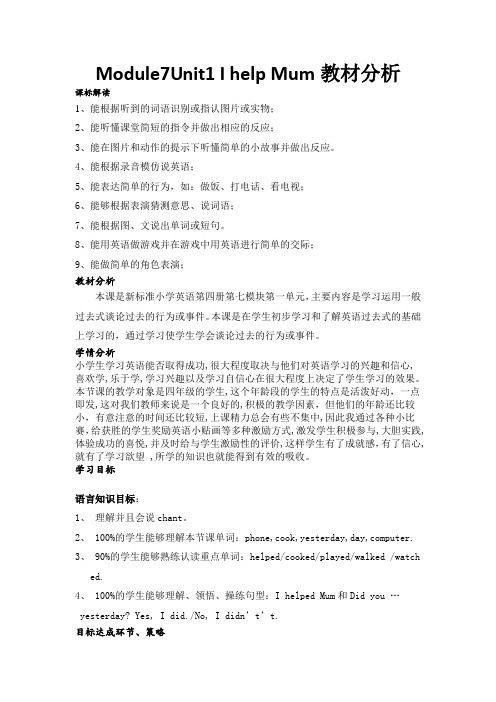
Module7Unit1 I help Mum教材分析课标解读1、能根据听到的词语识别或指认图片或实物;2、能听懂课堂简短的指令并做出相应的反应;3、能在图片和动作的提示下听懂简单的小故事并做出反应。
4、能根据录音模仿说英语;5、能表达简单的行为,如:做饭、打电话、看电视;6、能够根据表演猜测意思、说词语;7、能根据图、文说出单词或短句。
8、能用英语做游戏并在游戏中用英语进行简单的交际;9、能做简单的角色表演;教材分析本课是新标准小学英语第四册第七模块第一单元,主要内容是学习运用一般过去式谈论过去的行为或事件。
本课是在学生初步学习和了解英语过去式的基础上学习的,通过学习使学生学会谈论过去的行为或事件。
学情分析小学生学习英语能否取得成功,很大程度取决与他们对英语学习的兴趣和信心,喜欢学,乐于学,学习兴趣以及学习自信心在很大程度上决定了学生学习的效果。
本节课的教学对象是四年级的学生,这个年龄段的学生的特点是活泼好动,一点即发,这对我们教师来说是一个良好的,积极的教学因素,但他们的年龄还比较小,有意注意的时间还比较短,上课精力总会有些不集中,因此我通过各种小比赛,给获胜的学生奖励英语小贴画等多种激励方式,激发学生积极参与,大胆实践,体验成功的喜悦,并及时给与学生激励性的评价,这样学生有了成就感,有了信心,就有了学习欲望 ,所学的知识也就能得到有效的吸收。
学习目标语言知识目标:1、理解并且会说chant。
2、 100%的学生能够理解本节课单词:phone,cook,yesterday,day,computer.3、 90%的学生能够熟练认读重点单词:helped/cooked/played/walked /watched.4、 100%的学生能够理解、领悟、操练句型:I helped Mum和Did you …yesterday? Yes, I did./No, I didn’t’t.目标达成环节、策略语言技能目标:1、学生能够具有标准、流畅的语音、语调及语言交际能力,并会说懂Did you cook meat yesterday? Yes, I did. /No, I did’t。
- 1、下载文档前请自行甄别文档内容的完整性,平台不提供额外的编辑、内容补充、找答案等附加服务。
- 2、"仅部分预览"的文档,不可在线预览部分如存在完整性等问题,可反馈申请退款(可完整预览的文档不适用该条件!)。
- 3、如文档侵犯您的权益,请联系客服反馈,我们会尽快为您处理(人工客服工作时间:9:00-18:30)。
Module 7 Unit 1 I helped Mum
一、根据汉语写出正确的英文单词和短语。
1. 帮助
2. 烹调
3. 真的
4. 洗衣服
5. 电脑
6. 爱
7. 他(宾格) 8. 打电话 9. 怎么样
二、选出不同类的一项。
( )1. A. Friday B. Monday C. holiday ( )2. A. cooked B. house C. washed
( )3. A. noodles B. computer C. TV
( )4. A. Mum B. grandpa C. love
( )5. A. helped B. played C. really 三、选择最佳答案填空。
( )1. I ______ noodles yesterday.
A. cook
B. cooking
C. cooked
( )2. He played _______ the computer.
A. in
B. on
C. at
( )3. This is my son. I love _______ very much.
A. he
B. him
C. his
( )4. He _______ TV yesterday
A. watched
B. watches
C. watch
( )5. They ________ help Mum clean the room yesterday.
A. don’t
B. didn’t
C. doesn’t
四、小小翻译家。
1. 昨天是一个假期。
_______________________________________________________
2. Sam怎么样呢?
_______________________________________________________
3. 昨天我煮了面条。
_______________________________________________________
4. 他没有帮助妈妈。
_______________________________________________________
5. 我帮助了妈妈而且洗了衣服。
_______________________________________________________
6. 你是一个好女孩。
_______________________________________________________
7. 他玩电脑而且还看了电视。
_______________________________________________________
8. 我爱我的爸爸和妈妈。
_______________________________________________________
9. 昨天我的奶奶煮鱼了。
_______________________________________________________
10. 我们昨天在湖上划船。
_______________________________________________________
五、连词成句。
1. about, what, you (?)
_________________________________________________________
2. washed, I, yesterday, clothes, my (.)
________________________________________________________
3. had, all, we, very, a, day, happy (.)
________________________________________________________
4. day, was, a, it, beautiful (.)
______________________________________________
Module 7 Unit 1 I helped Mum. 练习答案
一、1. help 2. cook 3. really 4.wash clothes 5. computer 6. love
7. him 8. phone 9. What about
二、1. C 2. B 3. A 4. C 5. C
【解析】:
1. A项、B项是具体的星期几, C项是名词(假期)。
2. A项、C项是动词的过去式, B项是名词。
3. A项是食物类名词,B项、C项是家电类名词。
4. A项、B项是人物称谓、C项是动词(爱)。
5. A项、B项是动词的过去式,C项是副词。
三、1. C 2. B 3. B 4. A 5. B
【解析】:
1. yesterday是过去式的标志词,cook的过去式是cooked,故选C。
2. play on the computer意为“玩电脑”,故选B。
3. love是动词,后接宾语,him是he的宾格形式,故选B。
4. yesterday是过去式的标志词,watch的过去式是watched,故选A。
5. yesterday是过去式的标志词,助动词do用过去式did,否定形式为didn’t,故选B。
四、1. Yesterday was a holiday.
2. What about Sam? / How about Sam?
3. I cooked noodles yesterday.
4. He didn’t help Mum.
5. I helped Mum and I washed clothes.
6. You are a good girl.
7. He played on the computer and he watched TV.
8. I love my father and mother.
9. Yesterday my grandma cooked fish.
10. We rowed a boat on the lake yesterday.
五、1. What about you?
2. I washed my clothes yesterday.
3. We all had a very happy day.
4. It was a beautiful day.
百度文库是百度发布的供网友在线分享文档的平台。
百度文库的文档由百度用户上传,需要经过百度的审核才能发布,百度自身不编辑或修改用户上传的文档内容。
网友可以在线阅读和下载这些文档。
百度文库的文档包括教学资料、考试题库、专业资料、公文写作、法律文件等多个领域的资料。
百度用户上传文档可以得到一定的积分,下载有标价的文档则需要消耗积分。
当前平台支持主流的doc(.docx)、.ppt(.pptx)、.xls(.xlsx)、.pot、.pps、.vsd、.rtf、.wps、.et、.dps、.pdf、.txt文件格式。
本文档仅用于百度文库的上传使用。
